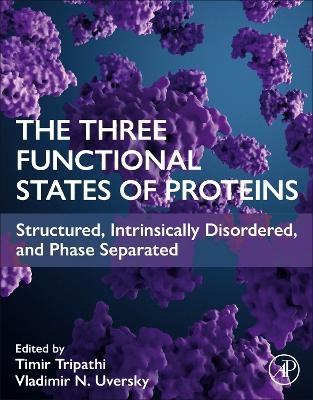
The Three Functional States of Proteins
Academic Press Inc (Verlag)
978-0-443-21809-5 (ISBN)
Prof. Timir Tripathi is a Professor of Molecular Biology in the Department of Zoology, School of Life Sciences, North-Eastern Hill University, Shillong, India. Earlier, he served as the Regional Director of Indira Gandhi National Open University, Kohima, Nagaland (2022-2023), where he contributed significantly to educational leadership, governance, and management. Before this, he was Senior Assistant Professor and Principal Investigator at the Department of Biochemistry, NEHU, Shillong (2009-2022). He holds a Ph.D. from Jawaharlal Nehru University, New Delhi, while working at the Central Drug Research Institute, Lucknow. He was a visiting faculty at ICGEB, New Delhi, India, and Khon Kaen University, Thailand. His research interests lie in the field of protein-substrate interaction and dynamics and understanding the roles of non-catalytic domains in regulating the catalytic activity of proteins. His primary focus is studying the conformational dynamics, interaction, and stabilization of the complexes formed by intrinsically disordered neuropathological protein aggregates, their properties of liquid-liquid phase separation, interaction, and roles in nucleocytoplasmic transport in neurodegenerative diseases. In addition, he is interested in analyzing the structural and functional characteristics of drug target proteins from the helminth liver fluke parasite Fasciola gigantica to identify new therapeutic strategies. He has received several national and international awards. He is an Associate Fellow of the Indian National Science Academy, New Delhi, and an elected member of the National Academy of Sciences, India, the Royal Society of Chemistry, and the Royal Society of Biology, UK. He has handled several research grants as a principal investigator from various national and international funding agencies. He has published over 100 research papers, reviews, commentaries, viewpoints, outlooks, and editorial articles in international journals, and has contributed several book chapters. He has edited six books and authored two textbooks for undergraduate and postgraduate students. Currently, he serves as the editor of the International Journal of Biological Macromolecules (Elsevier), senior editor of Critical Insights in Biophysics (Taylor & Francis), and is a member of the editorial boards of Scientific Reports and Acta Tropica. Prof. Vladimir N. Uversky, PhD, DSc, FRSB, FRSC, F.A.I.M.B.E., Professor at the Department of Molecular Medicine, Morsani College of Medicine, University of South Florida (USF), is a pioneer in the field of protein intrinsic disorder. He has made a number of groundbreaking contributions in the field of protein folding, misfolding, and intrinsic disorder. He obtained his academic degrees from Moscow Institute of Physics and Technology (Ph.D., in 1991) and from the Institute of Experimental and Theoretical Biophysics, Russian Academy of Sciences (D.Sc., in 1998). He spent his early career working mostly on protein folding at the Institute of Protein Research and the Institute for Biological Instrumentation (Russia). In 1998, moved to the University of California Santa Cruz. In 2004, joined the Indiana University−Purdue University Indianapolis as a Senior Research Professor. Since 2010, Professor Uversky is with USF, where he works on various aspects of protein intrinsic disorder phenomenon and on analysis of protein folding and misfolding processes. Prof. Uversky has authored over 1250 scientific publications and edited several books and book series on protein structure, function, folding, misfolding, and intrinsic disorder. He is also serving as an editor in a number of scientific journals. He was a co-founder of the Intrinsically Disordered Proteins Subgroup at the Biophysical Society and the Intrinsically Disordered Proteins Gordon Research Conference. Prof. Uversky collaborated with more than 12,500 colleagues from more than 2,750 research organizations in 89 countries/territories.
1. The three functional states of proteins: Beyond the classical “lock-and-key” paradigm
2. Ordered proteins and structure-function relationship: Classical view
3. Binding of a substrate (“lock and key”) and conformational adaption (“induced fit”) are different stages of enzyme action
4. Intrinsically disordered proteins: Functionality of chaos
5. Protein Conformation-based Phenotypic Switching and Implications in the Origin and Evolution of Multicellularity
6. Hybrid proteins: Fusion chimeras and natural wonders
7. Functional protein oligomers
8. Fuzzy complexes
9. SMARTQ: Single Molecule Amyloid fibRil Tracking and Quantification. A method for accurately imaging, tracking and quantifying the growth of individual amyloid fibrils using TIRF
10. Structural Polymorphism in Amyloids – States within Proteins’ Solid-State
11. Liquid-Liquid Phase Separation, Biomolecular Condensates and Membraneless Organelles: A Novel Blueprint of Intracellular Organization
12. Physical principles and molecular interactions underlying protein phase separation
13. Various levels of phase transitions in the protein universe
14. Targeting phase-separated protein states for drug discovery
15. Protein hydrogels: Structure, Characteristics, and Applications
16. Interactions among the three protein states
17. Protein frustration and fuzziness in the three functional states
18. Thermoresponsive intrinsically disordered protein polymers
19. The evolution and exploration of intrinsically disordered and phase-separated protein states
20. Computational modelling of intrinsically disordered and phase separated protein states
21. Molecular dynamics simulations of intrinsically disordered, fuzzy complexes, and phase separated protein states
22. Biological complexity of the phase separated protein states
23. Protein structure-function continuum
| Erscheinungsdatum | 30.11.2024 |
|---|---|
| Verlagsort | San Diego |
| Sprache | englisch |
| Maße | 216 x 276 mm |
| Gewicht | 450 g |
| Themenwelt | Mathematik / Informatik ► Informatik ► Theorie / Studium |
| Informatik ► Weitere Themen ► Bioinformatik | |
| Naturwissenschaften ► Biologie ► Biochemie | |
| Naturwissenschaften ► Physik / Astronomie ► Angewandte Physik | |
| ISBN-10 | 0-443-21809-9 / 0443218099 |
| ISBN-13 | 978-0-443-21809-5 / 9780443218095 |
| Zustand | Neuware |
| Informationen gemäß Produktsicherheitsverordnung (GPSR) | |
| Haben Sie eine Frage zum Produkt? |
aus dem Bereich


